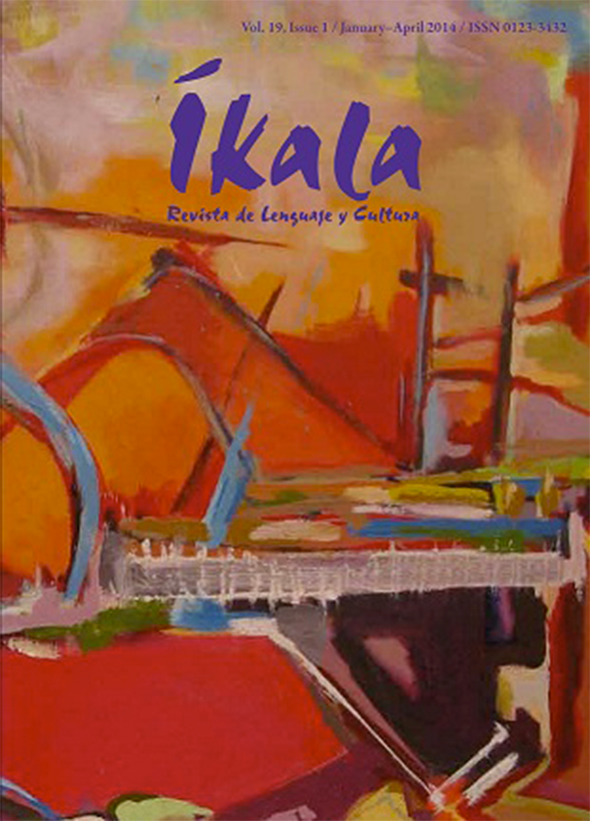National Bilingual Program: An Exploratory Study in the Department of Antioquia, Colombia
DOI:
https://doi.org/10.17533/udea.ikala.16978Keywords:
National Bilingual Program, language policy in Colombia, education reforms, English instruction, public schoolsAbstract
this research report presents the results of an exploratory study conducted in the Department of Antioquia about the views that National Bilingual Program stakeholders' had of the program itself and of the way it was being implemented in this region. Results from this study suggest that even though stakeholders did not have much information about the program, they did have a lot to say about the actions that the government had taken up to that moment in their localities and of the changes that were required for the program to effectively achieve its objectives.
Downloads
References
Ayala, J., & Álvarez, J. A. (2005). A perspective of the implications of the Common European Framework implementation in the Colombian socio-cultural context. Colombian Journal of Applied Linguistics, 7, 7–26.
Cárdenas, M. L. (August, 2006). Bilingual Colombia: Are we ready for it? What is needed? Presentación realizada en el 19th Annual English Australia education Conference, Perth, Australia. Recuperado de http://www.englishaustralia.com.au/index.cgi?E=hcat funcs&PT=sl&X=getdoc&Lev1=pub_c07_07&Lev2=c06_carde
Cárdenas, R., & Hernández, F. (2011). Towards the formulation of a proposal for opportunity-to-learn standards in EFL learning and teaching. Íkala, Revista de Lenguaje y Cultura, 16(28), 231–258.
Correa, D., & Usma, J. (2013). From a bureaucratic to a critical-sociocultural model of policymaking in Colombia. How Journal, 20, 226–24.
Day, C., & Sachs, C. (2009). Professionalism, performativity and empowerment: Discourses in the politics, policies and purposes of continuing professional development. En C. Day & J. Sachs (Eds.), International handbook on the continuing professional development of teachers (pp. 3–32). Berkshire, Inglaterra: Open University Press.
De Mejía, A. M. (2004). Bilingual education in Colombia: Towards an integrated perspective. International Journal of Bilingual Education and Bilingualism, 7(5), 381–397.
De Mejía, A. M. (2006). Bilingual education in Colombia: Towards a recognition of languages, cultures and identities. Colombian Applied Linguistics Journal, 8, 152–168.
De Zárate, M. (2007). Por un plurilingüismo desde la escuela primaria. Revista Internacional Magisterio: Educación y Pedagogía, 25, 58–60.
Escobar, W. Y. (2013). Identity-forming discourses: A critical discourse analysis on policy making processes concerning English language teaching in Colombia. PROFILE: Issues in Teachers' Professional Development, 15(1), 45–60.
Guerrero, C. H. (2008). Bilingual Colombia: What does it mean to be bilingual within the framework of the National Plan of Bilingualism? PROFILE: Issues in Professional Development, 10, 27–45.
Guerrero, C. H. (2010). The portrayal of EFL teachers in official discourse: The perpetuation of disdain. PROFILE: Issues in Teachers' Professional Development, 12(2), 34–49.
Gómez, V. (2007). Educación bilingüe: El desafío de los maestros indígenas: Experiencia de las escuelas Cubeodel Río Cuduyarí-Vaupez. Revista Internacional Magisterio: Educación y Pedagogía, 25, 44–46.
González, A. (2007). Professional development of EFL teachers in Colombia: Between colonial and local practices. Íkala: revista de lenguaje y cultura, 12(18), 309–332.
González, A. (2009). On alternative and additional certifications in English language teaching: The case of Colombian EFL teachers' professional development. Íkala: revista de lenguaje y cultura, 14(22), 183–209.
González, A. (2010). English and English teaching in Colombia: Tensions and possibilities in the expanding circle. En A. Kirpatrick (Ed.), The Routledge Handbook of World Englishes (pp. 332– 351). Londres, Inglaterra: Routledge.
Heck, R. (2004). Studying educational and social policy theoretical concepts and research methods. Mahwah, N.J: Lawrence Erlbaum Associates.
Herazo, J. D., Jerez, S., & Lorduy, D. (2012). Opportunity and incentive for becoming bilingual in Colombia: Implications for Programa Nacional de Bilingüismo. Íkala, Revista de Lenguaje y Cultura, 17(2), 199–213.
Levinson, B., Sutton, M., & Winstead, T. (2009). Education policy as a practice of power: Theoretical tools, ethnographic methods, democratic options. Educational Policy, 23(6), 767–795.
Ministerio de Educación Nacional. (octubre-diciembre de 2005). Colombia Bilingue. Altablero, 37. Recuperado de http://www.mineducacion.gov.co/1621/propertyvalue-32266.html
Ministerio de Educación Nacional. (23 de junio de 2008). Fullbright apoya la enseñanza del inglés en Colombia. Centro Virtual de Noticias de la Educación. Recuperado de http://www.mineducacion.gov.co/cvn/1665/w3-article-163489.html
Ministerio de Educación Nacional. (17 de noviembre de 2009). Desde el 17 de noviembre, 80 docentes se 'sumergirán' en Barranquilla en un ambiente bilingüe. Centro Virtual de Noticias de la Educación. Recuperado de http://www.mineducacion.gov.co/cvn/1665/w3-article-209290.html
Ministerio de Educación Nacional (Día, mes 2009). Inmersión eje cafetero 2008. Colombia aprende. Recuperado de http://www.colombiaaprende.edu.co/html/productos/1685/article-176040.html.
Miranda, N., & Echeverry, A. (2011). La gestión escolar en la implementación del programa nacional de bilingüismo en instituciones educativas privadas de Cali, Colombia. Íkala, Revista de Lenguaje y Cultura, 16(29), 67–125.
Sánchez, A. C., & Obando, G. V. (2008). Is Colombia ready for ''bilingualism''? PROFILE: Issues in Teachers' Professional Development, 9, 181–196.
Shohamy, E. (2006). Language policy: Hidden agendas and new approaches. New York, NY: Routledge.
Usma, J. (2009a). Education and language policy in Colombia: Exploring processes of inclusion, exclusion, and stratification in times of global reform. PROFILE: Issues in Teachers' Professional Development, 11, 123-141.
Usma, J. (2009b). Globalization and language and education reform in Colombia: A critical outlook. Íkala, Revista de Lenguaje y Cultura, 14(22), 19–42.
Valencia, M. (2013). Language policy and the manufacturing of consent for foreign intervention in Colombia. PROFILE: Issues in Teachers' Professional Development, 15(1), 27–43.
Whitty, G. (2002). Making sense of education policy: Studies in the sociology and politics of education. Londres, Inglaterra: Paul Chapman.
Whitty, G. (marzo, 2006). Teacher professionalism in a new era. Presentación realizada en el First General Teaching Council for Northern Ireland Annual, Belfast. Recuperado de http://www.gtcni.org.uk/publications/uploads/document/annual%20 lecture%20paper.pdf
Published
How to Cite
Issue
Section
License
Copyright (c) 2014 Íkala, Revista de Lenguaje y Cultura

This work is licensed under a Creative Commons Attribution-NonCommercial-ShareAlike 4.0 International License.












